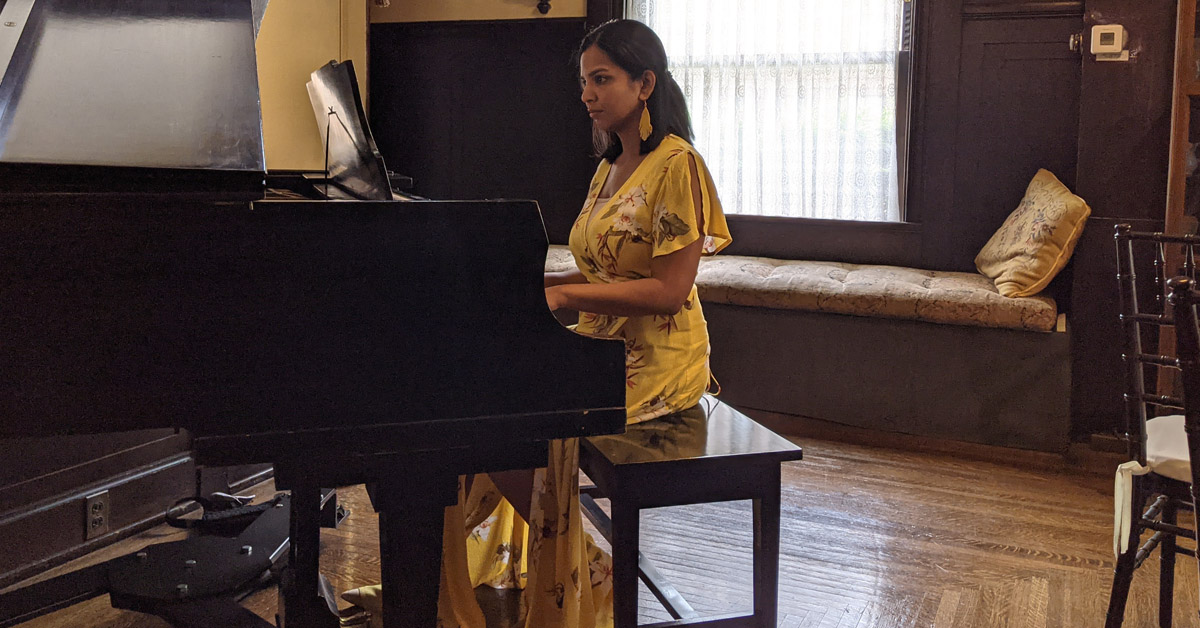Madhura Vachon is an Environmental Health Sciences PhD student at the University of Minnesota School of Public Health. Madhura’s public health education and experience is focused on reducing the impact of infectious diseases on the global population. Learn more about her experience as a U of MN School of Public Health PhD candidate by reading her responses to the questions below.
Where did you attend undergrad and what was your degree/area of study?
[Madhura] I went to Indiana University in Bloomington and I was a music major (oboe) at the Jacob’s School of Music. I was really interested in the sciences, but I’ve also always loved music and jumped at the chance to do both when I auditioned and got in. I ended up completing a BS in Oboe Performance and an outside field in Biology, with a minor in Chemistry. Then, for grad school, I attended Indiana University–Purdue University in Indianapolis and completed my MPH with a focus on Epidemiology and Social & Behavioral Sciences.

How did you become interested in public health?
[Madhura] I’ve always been really aware of the immense importance and large-scale impact of public health — that’s why I started my MPH degree. But it was really a trip to Haiti following the 2010 earthquake that made me commit to studying infectious diseases. I worked with a group through the University of Notre Dame to establish an in-school health clinic with the hope that we’d be able to improve both school attendance and student health. I walked away from the experience with a deeper understanding of the role strong public health systems play in preventing disease.
How did you get into studying infectious diseases?
[Madhura] My experience in Haiti really convinced me of the need and impact of working in public health, especially as it relates to improving access to treatments that people previously did not have access to. Additionally, I had the chance to hear from public health experts from the Indiana Department of Health during graduate school, and I was fascinated with the methods and process of epidemiology. Epidemiologists are like ‘disease detectives’. I liked the idea of mystery-solving and the fact that there was a new problem to solve every day.
Are there specific infectious diseases you’re interested in?
[Madhura] Yes, I’ve worked primarily with foodborne diseases, and my primary research now focuses on Shiga toxin-producing E. coli bacteria. When I worked as an enteric epidemiologist for the Indiana Department of Health, we would frequently conduct traceback investigations to identify the source of outbreaks. Several preventable infections, and sadly even fatalities in young children exposed to this harmful form of E. coli, really motivated me to research it further.
What research are you involved with right now?
[Madhura] My dissertation work is focused on the concept of “One Health,” which describes how public health interventions must address the intersectionality between human, animal, and environmental health in order to be successful. Most recently, I’ve been characterizing the transmission of Shiga toxin-producing E. coli within agricultural fair settings. I conducted surveys at the Minnesota State Fair to understand what influences hand-washing behaviors, especially after people visit animal farms and exhibits that might expose them to harmful pathogens.
Have you done any research related to the COVID-19 pandemic?
[Madhura] Yes! I have been able to work with SPH Professor Craig Hedberg on a study looking at the risk of COVID-19 among Minnesota grocery workers. We found that grocery workers did not have an increased risk of developing COVID-19 when compared to the general public, though we did discover that workers who have more extensive job responsibilities within a store location may have an increased risk of contracting COVID-19.
What are the reasons why you chose your program? What do you like about it?
[Madhura] When I was working at Indiana Department of Health, we were lucky to meet other epidemiologists across the country through a mentorship program. I had the good fortune of connecting with the Minnesota Department of Health (MDH), which is one of the Centers for Disease Control and Prevention (CDC) Integrated Food Safety Centers of Excellence. I was introduced to Professor Craig Hedberg through colleagues at the MDH and it was an instant fit. I was extremely impressed with the strong collaborative relationship between the UMN School of Public Health and the MDH. That kind of partnership was exactly what I was looking for in a program.
What do you like about being in Minnesota?
[Madhura] There’s a lot to like, but I’ve really enjoyed exploring the Twin Cities. From the terrific public transportation system to downtown skyways, it’s really one of the best designed cities I’ve ever been to. I especially love the amount of green space — sometimes it feels like our cities were built inside a giant park. People kept warning me about the cold, but I’ve really appreciated how sunny it is despite the chilly temperatures! It’s a great place to live.

